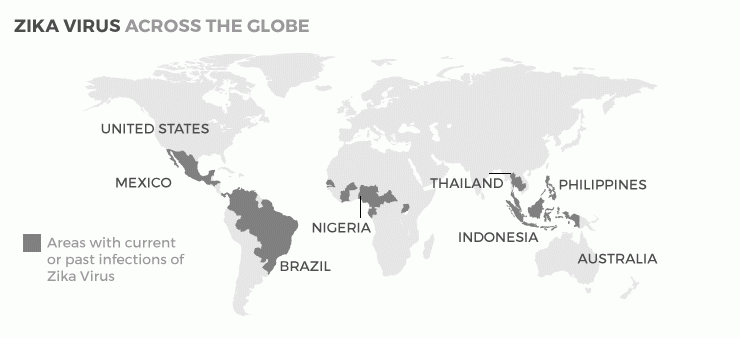Northern Australia braces for arrival of Zika virus

Northern Australia is bracing for the arrival of the rapidly moving Zika virus, just one day after the World Health Organisation (WHO) declared the outbreak an international emergency.
Late on Tuesday, public health authorities in NSW revealed that two cases of the virus had been discovered in people who had returned from the Caribbean, but said the virus was unlikely to take hold in the state because conditions were not suitable for the mosquito which carries it.
“It is very unlikely that Zika virus will establish local transmission in NSW as the mosquitoes (Aedes aegypti) that spread the infection are not established here – although they are found in some parts of north Queensland,” said a statement from NSW Health.
Sights on the world’s deadliest animal as Zika virus spreads
The news arrived after the WHO warned the virus was an “extraordinary event” that was “spreading explosively” before experts cited evidence that the frightening virus may be under-diagnosed, right on Australia’s doorstep.
Other reports emerged about an Australian man who may have been infected with Zika by a monkey in the popular tourist destination of Bali, and of seven other Zika cases of the virus returning to Australia in the past four years.
While many of Zika’s symptoms are mild in comparison to many mosquito-borne diseases, the disease is particularly dangerous for pregnant women and their unborn children.
Many infected women have given birth to children with severe deformities, including microcephaly (abnormally small heads). Click the owl to read more:

Source: Centre for Disease Control and Prevention (CDA)
“Although reported human cases of ZIKV [Zika] infection have been rare in Southeast Asia, confusion with dengue and difficulty in obtaining a laboratory diagnosis are likely causing its incidences to be underestimated,” an Eijkman Institute for Molecular Biology report stated.
Another report – by the American Society for Tropical Medicine and Hygiene (ASTMH) – flagged similar fears about the virus’s close relationship to dengue fever.
“It is likely that many cases are either undiagnosed (because of mild symptoms) or misdiagnosed, presumably most commonly as dengue fever, given their clinical similarities,” it wrote.
The New Daily asked the Department of Foreign Affairs and Trade if it would warn Australian travellers heading to southeast Asia about the virus, however it responded by saying that “Indonesia is not one of the countries where the Department of Health considers that transmission of the Zika virus is ongoing”.
DFAT said it had published an updated list of countries affected by Zika virus here.
“The potential is there definitely for people to come back [from overseas] and risk the possibility infecting others.”
University of Sydney infectious disease expert Professor Edward Holmes confirmed to The New Daily that Zika could be under-diagnosed in southeast Asia.
“It has been around for a long time and it could be unreported,” Professor Holmes said.
“Its symptoms are often very mild or sometimes there are none so it could be [under-diagnosed].”

A Brazilian baby born with the effects of an illness linked to Zika. Photo: Getty
However, Professor Holmes was skeptical about how dangerous the virus would be in Australia, despite the measures being taken in Cape York.
“The risks are very low. It requires a lot of mosquitoes in high density and often we can control that,” he said.
“I am not massively worried about it at all.”
Aussie town braces for Zika
On Friday, the Apunipima Cape York Health Council (ACYHC) in Cape York, Queensland, told residents “to clean up their backyards, use barriers for the dengue mosquito (which is able to carry the Zika virus) and don’t leave water lying around”.
“For some people to not have water around the house in these hot conditions is big, but it will help keep the mosquitoes away,” ACYHC’s Dr Mark Wenitong told The New Daily.
“Cape York has the perfect conditions for these mosquitoes,” he said. “It is vital we clean up yards and make sure no water is left lying around.
“The mosquitoes strike in the morning and in the evening so people should make sure they’re protected at these times.”
• Zika can be sexually transmitted: experts
• Aussie tourists urged to avoid these countries
• Australian olympic body warns of Zika virus
• This breakthrough could help eradicate Ebola
He suggested repellent, coils, protective clothing and surface sprays would help prevent stings at these times.
Dr Wenitong warned that Zika-carrying mosquitoes lived where humans were, so it was crucial that urban areas in Cape York were rid of places the insects liked to live.

DFAT did not have any plans for travel warnings in South East Asia. Photo: ABC
“It’s all about making sure people have the right information to act on this risk,” he said.
“The potential is there definitely for people to come back [from overseas] and risk the possibility infecting others.”
The Zika virus is spread by mosquitoes, who pass the condition from human to human via its sting.
Queensland is the only place in Australia where the Aedes type of mosquito, thought to be spreading the virus, resides.
It was confirmed on Wednesday that Zika can be sexually transmitted. There is no vaccine.
Brazil has reported 4000 suspected cases of microcephaly, the condition in newborn babies that Zika is thought to be linked to.
It causes babies to be born with sometimes-fatal birth defects, including abnormally small heads.
The Pan American Health Organisation said Zika had now spread to 24 nations and territories in the Americas.
Colombia has so far reported more than 20,000 cases of Zika, including 2100 in pregnant women.
The WHO said last week the Zika virus was “spreading explosively” and could infect as many as four million people in the Americas.
Brazil is due to host the Olympic Games in Rio de Janeiro in August.









